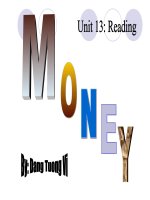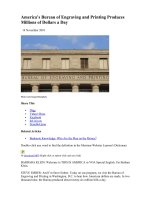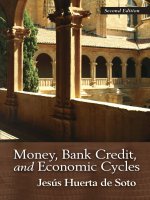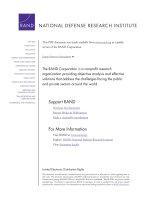money
Bạn đang xem bản rút gọn của tài liệu. Xem và tải ngay bản đầy đủ của tài liệu tại đây (634.33 KB, 36 trang )
Rewrite the following sentences, reducing a
clause to a phrase.
1. You can go to bed when you are tired.
You can go to bed when being tired.
2. Tom felt sad when he was punished by the
teacher.
Tom felt sad when being punished by the
teacher.
Tom felt sad when punished by the
teacher.
3. While Mary was waiting for me, she saw an
accident.
While waiting for me, she saw an accident.
While waiting for me, Mary saw an
accident.
True
False
False
4. After I had met the movie star in person, I
understood why she was so popular.
After having met the movie star in person, I
understood why she was so popular.
5. Before Nick left on his trip, his boss gave him a
big rise
Before leaving on his trip, his boss gave him
a big rise.
Cannot reduce, because: Difference
Subjects
True
False
Arrange the following saying in right order
La cai da cua danh vong
La suc bat cua lo xo
La suc khoe cua tuoi gia
La cai long cua chan ly
Tien la Tien la Phat
La noi lo cua tuoi tre
La het y cua tinh yeu
Tien la Tien la Phat
La suc bat cua lo xo
La noi lo cua tuoi tre
La suc khoe cua tuoi gia
La cai da cua danh vong
La cai long cua chan ly
La het y cua tinh yeu
“A fool and his money are soon parted.”
“Look after the pennies, and the pounds will look
after themselves.”
“Annual income twenty pounds, annual
expenditure nineteen nineteen and six, result
happiness. Annual income twenty pounds, annual
expenditure twenty pounds ought and six, result
misery.”
“A fool and his money are soon parted.”
“Look after the pennies, and the pounds will look
after themselves.”
“Annual income twenty pounds, annual
expenditure nineteen nineteen and six, result
happiness. Annual income twenty pounds, annual
expenditure twenty pounds ought and six, result
misery.”
Income: 20 £
Expenditure: 19 £ + 19 s + 6 p
Benefit: 6 p
Income: 20 £
Expenditure: 20 £ + 0 s + 6 p
Debt: 6 p
•
penny (n): dong xu
•
pennies/ pence(pl.n ):
•
shiling(n): dong silinh
•
pound (n): dong bang Anh
-
Before 1972:
1 pound = 20 shilings, 1 shiling = 12 pennies
-
Now:
1 pound (£)= 100 pence (p)
Fool (n): ke
ngoc
•
to part:chia tay ai
•
She has parted
from me
Annual (adj):
hang nam,
nam mot, tung
nam
Income[(n):
thu nhap]
Expenditure(n)
: # income: su
chi tieu
Ought (n): so khong]
•
Misery(n):
# happiness:
su khon kho.”
Money is used for buying and selling goods, for
measuring value and for storing wealth. Almost every society
now has a money economy based on coins and paper notes
of one kind or another. However, this has not always been
true.
Coin (n):
tien kim
loai
Wealth (n):
cua cai, tai
san
To measure:
do, do luong,
danh gia
Be used for + V-ing:
duoc su dung de
Money (UN)
Economy (n): nen kinh te
Money economy: nen kinh te tien te
Monetary (adj): thuoc ve tien te
The monetary unit of Viet Nam is the dong.
________________ England ___the pound.
___________The United State ___the dollar.
Paper note
(n): tien giay
In primitive societies a system of barter was used.
Barter was a system of direct exchange of goods.
Somebody could exchange a sheep, for example, for
anything in the market-place that they considered to
be of equal value. Barter, however, was a very
unsatisfactory system because people’s precise needs
seldom coincided.
Exchange (n):
su trao doi
Primitive (adj):
nguyen thuy
Primitive societies
Primitive man
Equal (adj):
ngang bang,
tuong duong
Precise (adj):
exact: chinh xac
Seldom (adv):
hiem khi
Coincide (v):
xay ra dong
thoi, trung voi
- Her hobbies
coincides with
mine
Value (n): gia
ca, gia tri
Barter (n):
hang doi
hang
unsatisfactory (n):
su khong thoa
dang
People needed a more practical system of exchange, and
various money systems developed based on goods which
the members of a society recognized as having value.
Cattle, grain, teeth, shells, feathers, skulls, salt,
elephant, tusks and tobacco have all been used.
Practical (adj):
thiet thuc, thuc te
Various (adj):
da dang
To recognize:
thua nhan,
nhan ra
Grain (n): thoc lua
Shell (n): vo (so, ngeu, hen)
Feather (n): long vu
Skull (n): so
Tusk (n): nga voi
Tobacco (n): thuoc la
Grain (n): thoc lua
Shell (n): vo (so, ngeu,
hen)
Feather (n): long vu
Skull (n): so
Tusk (n): nga voi
Tobacco (n):
thuoc la
Precious metals gradually took over because, when
made into coins, they portable, durable, recognizable and
divisible into larger and smaller units of value.
Precious (adj): quy, quy gia
Metal (n): kim loai
Portable (adj):de mang theo
Durable (adj): ben, vung chac
To recognize
Recognizable: de nhan dien
Divisible (n): co the chia duoc
A coin is a piece of metal, usually disc-shaped, which
bears lettering, designs or numbers showing its value.
Until the eighteenth and nineteenth centuries coins were
given monetary worth based on the exact amount of metal
contained in them, but most modern coins are based on
face value, the value that governments choose to give
them, irrespective of the actual metal content.
Disc-shaped
(adj): hinh dia
Bear (n):
mang, co
Lettering (n): su khac chu,
chu viet, su ghi chu
Design (n): mau trang tri,
mau thiet ke, hoa tiet
Worth (n)=value
Face value:
gia tri ghi tren
mat dong tien
Irrespective (adj):
bat ke, bat chap
•
Actual (adj):
tren thuc te
•
Content (n):
luong, noi
dung
Contain (v);
chua dung,
gom co









